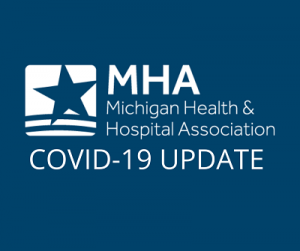
“Every child begins the world again.” ― Henry David Thoreau
 In all of my life experiences to date, none have been so challenging in every sense as those times when my young children were hospitalized in the NICU, fighting for their very lives. We were incredibly fortunate to have positive outcomes with both of them, thanks to the efforts of our Michigan hospitals and the incredible people who work there every day.
In all of my life experiences to date, none have been so challenging in every sense as those times when my young children were hospitalized in the NICU, fighting for their very lives. We were incredibly fortunate to have positive outcomes with both of them, thanks to the efforts of our Michigan hospitals and the incredible people who work there every day.
I share this perspective because there is a crisis throughout Michigan that truly hits home with me. I know the angst and exhaustion being felt by far too many parents right now – emotions that are also being acutely felt by our heroic caregivers. In short, it feels like déjà vu in Michigan’s children’s hospitals, but instead of a surge of COVID-19 patients stressing capacity to the limits, our facilities are strained by a high number of pediatric patients suffering from respiratory illnesses largely driven by RSV. Similar tactics that have been implemented in prior years, such as initiating incident command systems, have been in operation to ensure appropriate direction and communication is occurring throughout those systems impacted by this crisis.
Hospitals operating at capacity is nothing new and the staffing challenges that continue to result in Michigan operating with 1,700 fewer staffed beds than we had prior to the pandemic are well documented. What we’re seeing today is the real impact of what those staffing challenges mean: longer wait times in the emergency department, lack of available beds for patient transports (particularly in rural Michigan) and pediatric ICUs operating at beyond 100% capacity.
There are few professionals in the world that have proven to be more resilient than healthcare workers, whether they are physicians, nurses, respiratory therapists, environmental service workers…the list goes on and on (and I am proud to say that the MHA Keystone Center has played an important role with the launch of our WELL-B initiative that continues to provide resiliency tools for our clinicians and other team members). But as residents of our communities, we can no longer take our healthcare workers and the access to care they provide for granted. These workers, and their organizations, need help.
Thankfully, the Michigan Legislature provided funding earlier this year through Public Act 9 to improve the recruitment, retention and training of healthcare workers. So far, over 69,000 healthcare workers have benefitted from that funding and it has helped to stabilize existing staffing levels. Hospitals are also exploring innovative ways to grow the talent pipeline, such as investment in higher education partnerships and other apprenticeships. However, while impactful, this funding is a finger in the dyke. Without additional attention, the problem will persist.
Addressing the strain on our children’s hospitals is a multi-pronged approach, and in addition to the aforementioned work of our MHA Keystone Center, we are also deriving input and guidance from our MHA Council on Children’s Health, led by Laura Appel, executive vice president for government relations and public affairs, as well as our system chief medical officer (CMO) group, led by our own CMO Gary Roth, DO.
While the MHA will continue to pursue legislative and regulatory solutions to the staffing crisis, there are actions anyone can undertake to help our healthcare workers caring for very sick children across Michigan, particularly as COVID-19, RSV and the flu converge to drive hospitalizations.
First and foremost, ensure that both you and your children are up to date on all the relevant vaccinations that are now readily available. The MHA is a long-time supporter of I Vaccinate which is a good source of information on vaccines, and our MHA Senior Vice President of Public Affairs and Communications Ruthanne Sudderth continues to be our point person with this organization. Second, practice proper hygiene, including handwashing and staying home when sick. Third, seek the appropriate setting for care; visit the hospital for emergencies but contact your primary care physician or an urgent care facility for testing or care for mild symptoms. Lastly – and very importantly – be sure to express some grace and appreciation for any healthcare worker you meet. As we approach the winter and holiday season, they are here to provide exceptional care to all who need it and deserve to be treated with respect both on and off duty.
If you have not done so already, please join me in sharing this messaging within your networks. Our hospitals need the support from our partners in healthcare, the business community and in Lansing and Washington, DC to weather this storm. Respiratory illnesses will always be here, but there are many small actions we can take to care for the health and wellness of our communities well into the future.
As always, I welcome your thoughts.


